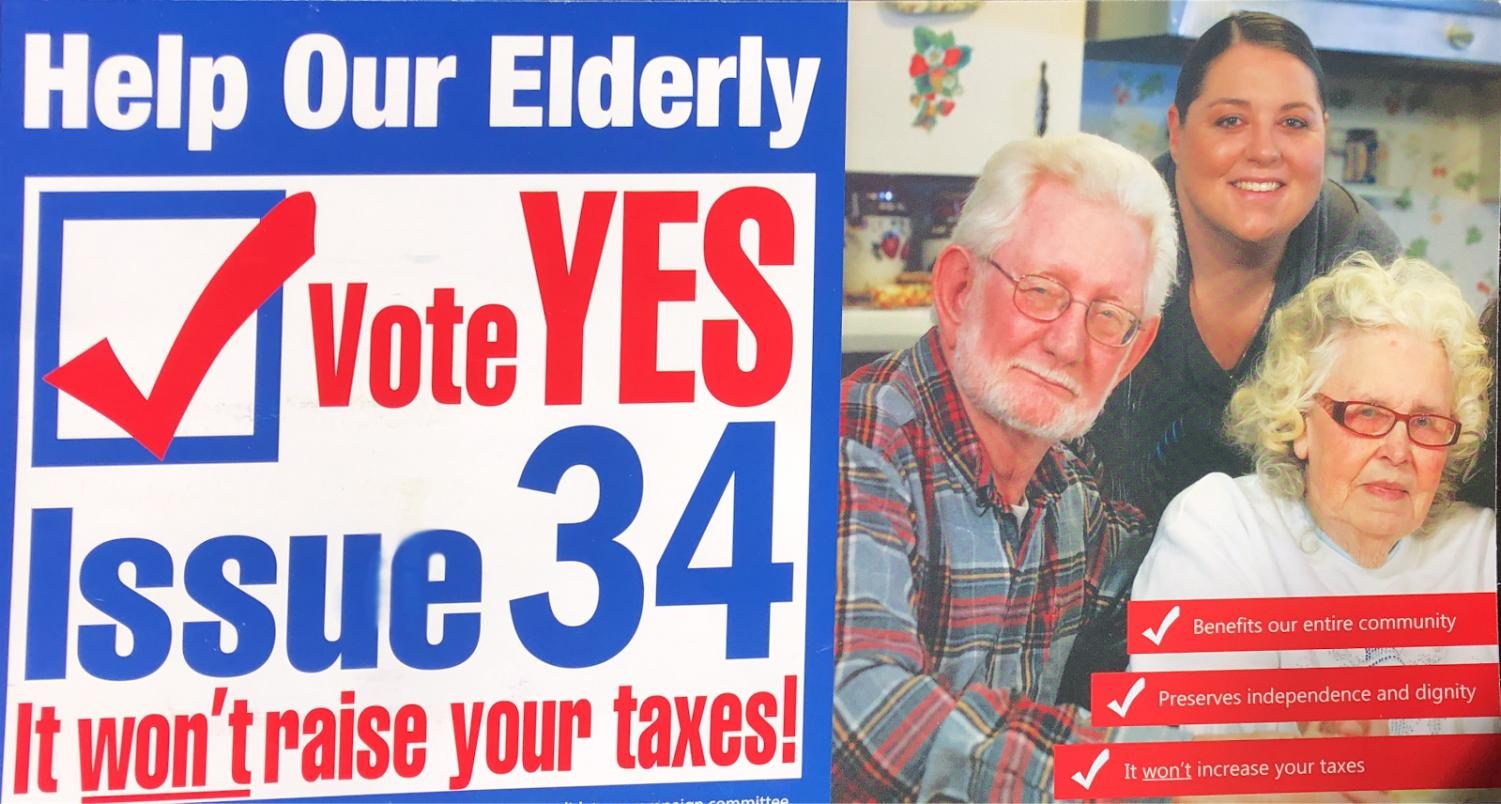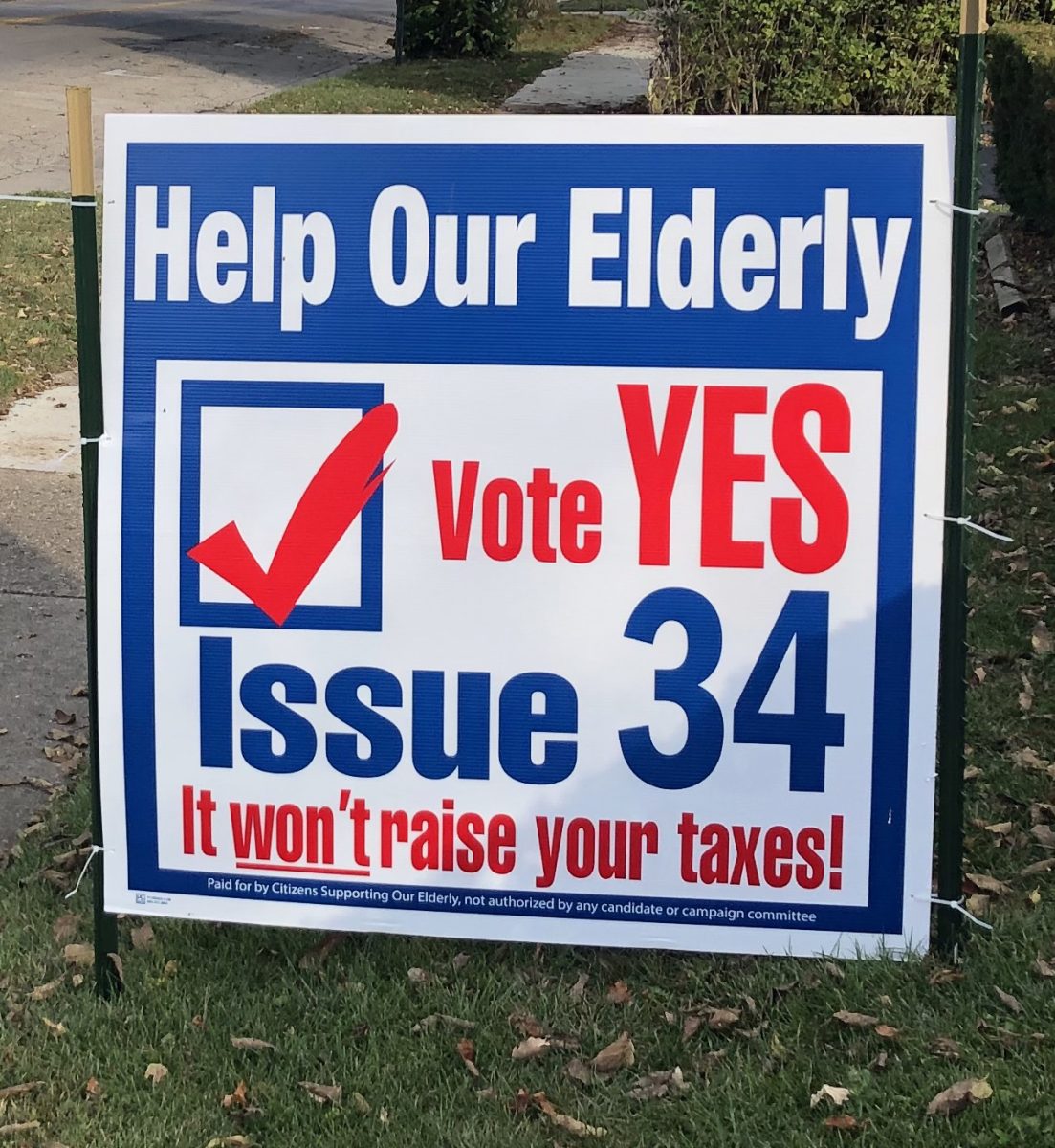Oxford Seniors advocates for elderly services levy renewal
The Butler County Elderly Services Levy is Issue 34 on the ballot. It is for a $1.3 million renewal. Photo by Dan Wozniak
October 23, 2020
Butler County voters will consider whether to renew the $1.3 mill elderly services levy on the Nov. 3 ballot.
Sabrina Jewell, the marketing and outreach coordinator for Oxford Seniors, spoke in favor of the renewal Tuesday, Oct. 20 during the Oxford City Council meeting.

The levy generates $10 million a year for the county’s Elderly Service Program (ESP), which helps seniors stay at home as long as possible through programs such as senior day care, meals and nutritional counseling, transportation services and independent living assistance.
“Our families depend on [the program],” Jewell said. “We provide a lot of services, and I hope that we have your support.”
The levy renewal is voted on every five years and costs homeowners $42 a year per $100,000 of property tax valuation. The last renewal of the levy passed in 2015, with nearly 75% of the vote.
Jewell said that most of the funds are allocated toward hands-on, in-home services and home modifications, such as handrail and wheelchair ramp installations.
Butler County’s ESP also funds the Meals on Wheels food delivery service, which operates through Oxford Seniors.
“If the levy fails, we would have a very difficult time serving over 4,000 seniors and their families in Butler County,” Jewell said.
According to the 2019 Butler County Elderly Services Program Annual Report, 86% of those who receive services are over 70 years old and have a monthly mean income of $1,970.
Katy Abbott, associate professor of gerontology and a Scripps Gerontology Center research fellow at Miami University, said by approving the levy and enabling people to live in their homes longer, taxpayers save money in costs they would otherwise pay in nursing homes fees.
“There’s a cost-savings to our state through these levy programs, and it’s also what people want,” Abbott said. “[Seniors] want to remain in their own homes and remain as autonomous as they can.”
According to the independent SAGE Research Journal, it is estimated that only 15 states utilize local funding streams to provide supportive services for older adults and their family or friend caregivers.
Seniors are hurting during the pandemic
Oxford Seniors is the only location in Butler County that offers community adult day-services, which provide supportive in-person care and activities for older adults with special needs. However, these programs are not currently operating because of the COVID-19 pandemic, Jewell said.

Though the state-issued permission for the organization to re-open for face-to-face activities on Sept. 21, it is still undetermined when Oxford Seniors will resume community adult day services.
Jewell said the postponement of in-person programs has probably increased caregiver stress and impacted seniors’ mental health.
“Even my healthiest, most robust seniors who were coming to the center every day are really starting to age much more quickly,” Jewell said. “It’s very tragic.”
To help seniors who may be suffering from depression, anxiety or other behavioral health issues, Community Behavioral Health operates the Uplift Program, an in-home counseling program for clients of the Butler County Elderly Services Program.
Randy Allman, the CEO of Butler County Behavioral Health, said most Uplift counseling sessions are currently being conducted virtually to protect seniors from the virus, but the quality of care is not compromised.
According to a 2016 study published in the World Journal of Psychiatry, telepsychiatry is comparable to face-to-face services in terms of reliability of clinical assessments and treatment outcomes.
Although a new survey by the American Association of Retired Persons and United Health Foundation found that among adults ages 50 and older who reported experiencing social isolation during the pandemic, 50% felt less motivated, 41% were more anxious and 37% felt depressed. Allman said there has not been a notable increase in Uplift counseling sessions.
“Social isolation is a major problem,” Abbott said. “Oftentimes, we don’t know who’s socially isolated because they’re kind of disconnected.”
To help seniors in isolation without subjecting them to COVID-19 risks, Abbott recommended standing in doorways on opposite sides of screen doors or simply phoning the elderly.














